Let's put more words to paper about an unlocalized Vita galge in English than anyone else on the entire Internet
This post originally ran on Cohost on 2023/2/21 and is being reuploaded here for future posterity. The content has been lightly edited for enhanced readability.
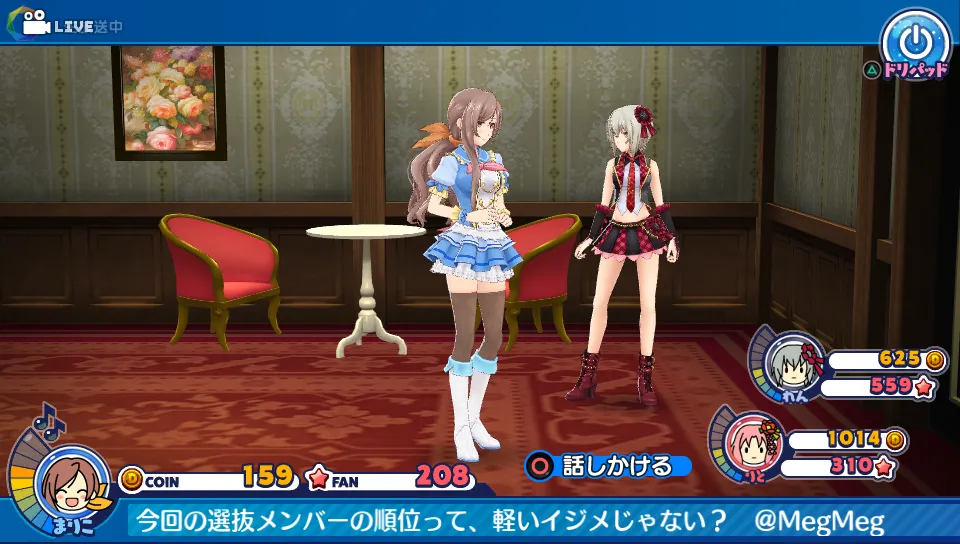 |
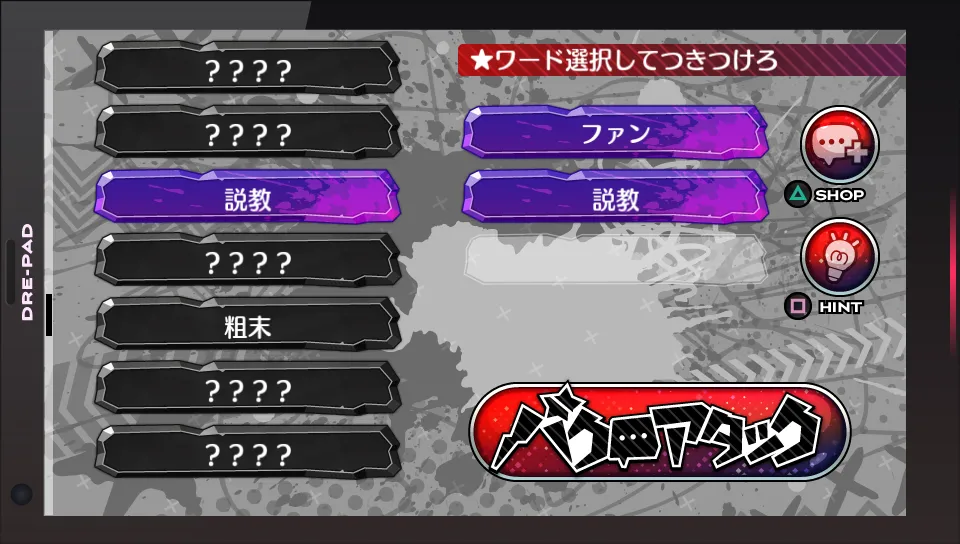 |
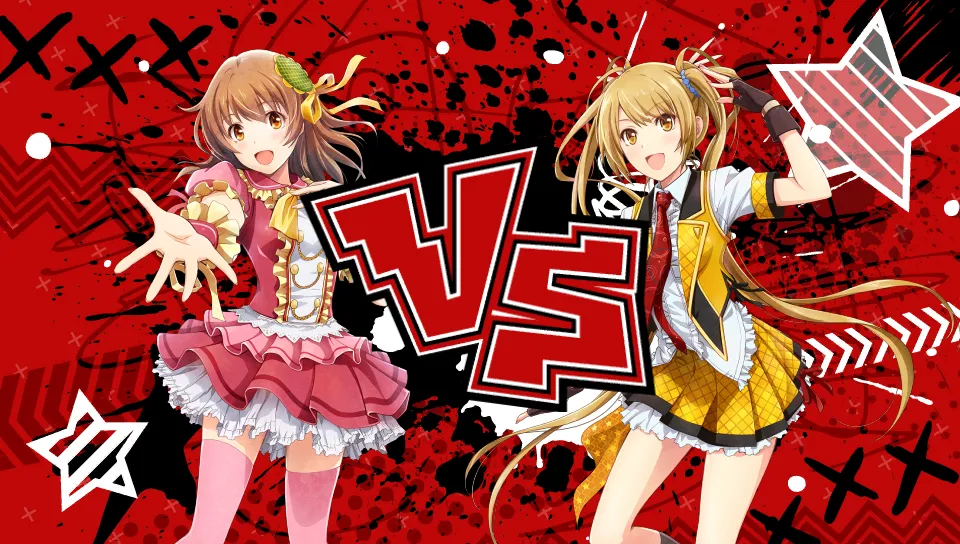 |
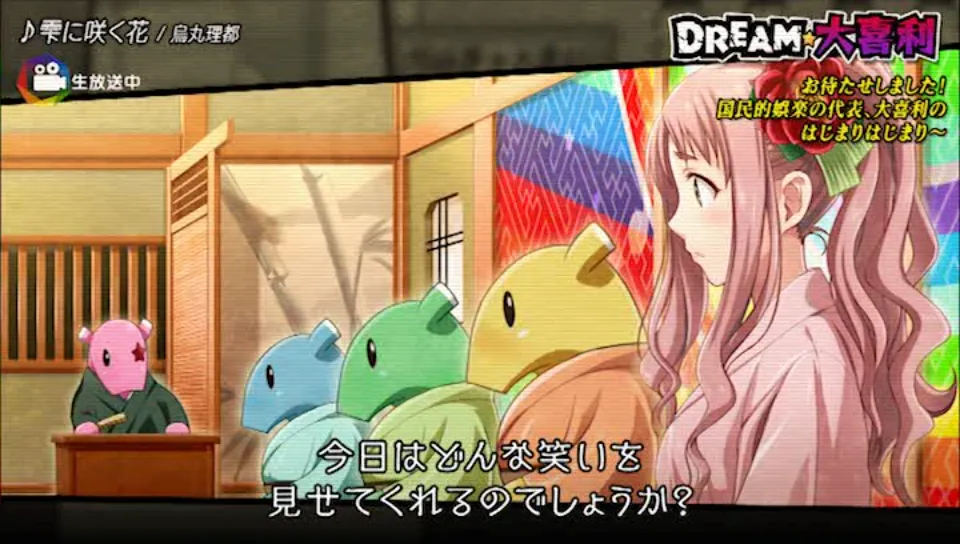 |
You'd think that after recently obtaining some vintage, bona fide bangers like MGS1 and Ex-Ranza, both in Japanese, I'd be feasting on classic games right about now as my retro setup nears completion for the foreseeable future. You wouldn't be entirely wrong, I've been doing plenty of that. But I can also never truly turn off the part of my brain that feels the urge to play any mildly novel-looking Japanese galge and see if there's actually any meat to it. That's exactly how, after years of looking at its cover art and thinking, "I like these character designs at least," I finally found myself picking up a copy of D3's Idol Death Game TV on the cheap over the weekend.
Idol Death Game, it may shock you to hear, revolves around a group of seven idols tricked into taking part in a life-or-death game on live TV where the winner gets to take the center spot at the year's big concert. If you haven't heard of it—and chances are pretty good you haven't unless you were really plugged into the import game scene circa 2016—it's an unlocalized galge for the Vita, a pretty ignominious distinction for a platform that was littered with localized galge, plenty of which were stinkers. Barring some notable exceptions with extenuating circumstances like (get ready for it) Amagami, Vita galge that didn't get localized tended to either be exceptionally mediocre or exceptionally infamous in ways that foreign ratings boards would take issue with, if not quite possibly both, on top of having insufficient international demand to merit going to the trouble in either case. As a result, I didn't exactly go into this with much in the way of expectations, especially with D3's proclivity for humble budgets, and, indeed, so far, Idol Death Game hasn't gone out of its way to impress me.
As you can probably imagine from both the premise and aesthetics, Idol Death Game very much wants to be the next Dangan Ronpa. It keeps its cast locked up inside of a building. It's got character deaths at the end of every chapter. And it's got its own diminutive mascot portrayed by an incredibly famous Japanese actor, in this case a pink tapir voiced by Kappei Yamaguchi employing his trademark high-pitched screeches. While it's fair to say that it never truly begins to compete when it comes to those similarities, it's in its differences that the package lacks much definition and meaning in terms of progression and mechanics. The idea that the game tries to impress upon you is that each chapter is a cutthroat race to the finish line as the idols scramble to not be the last to complete each challenge, all while having their secrets uncovered and exploited for personal gain. In practice, the gameplay is essentially a tedious pixel hunt played from a sidescrolling perspective where you incessantly tap the O button on objects, which mostly turns up generic coins that can be spent elsewhere, as well as the occasional hint of one of an idol's myriad secrets. These hints get used in confrontations that can be initiated by you or other idols where you each present a secret about the other and whoever is deemed to have offered up the more salacious anecdote wins a large chunk of the other idol's coins while also taking out a good chunk of their morale, a system which itself barely factors into the proceedings.
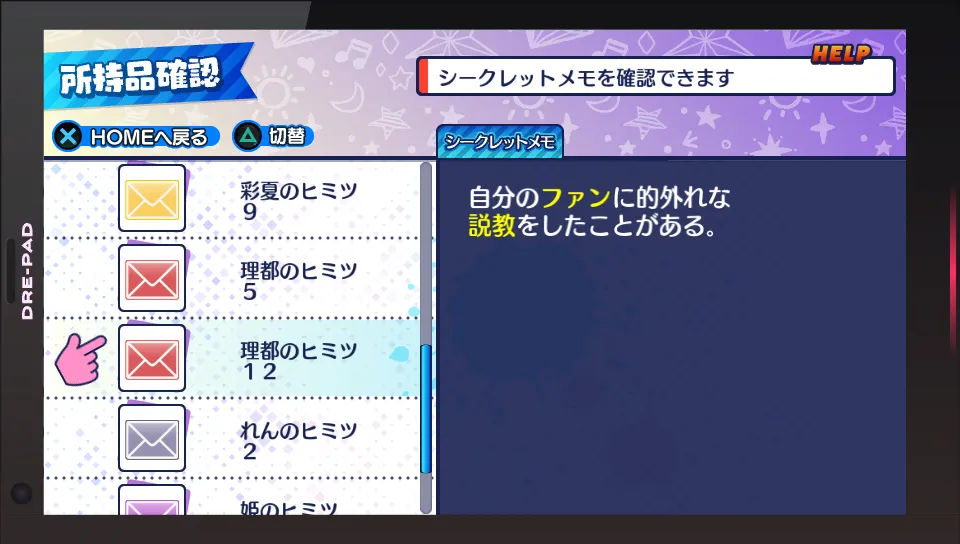
Aside from being incredibly boring, tedious, and time-consuming affairs, the main problem with these secret showdowns is that merely knowing about an idol's secrets isn't enough. In order to actually offer up a secret, you also have to possess a handful of keywords specific to that secret in your inventory, which are consumable. This despite the fact that, you know, you're otherwise a perfectly literate human being and can read the keywords right there in the hints. While you start off with a handful of keywords in your inventory, you likely won't have all of the ones necessary to assemble most of the secrets you find. How do find more? By buying them from the in-game store, using the coins that you typically obtain at very meager rates, 50 or 100 at a time. You don't even scavenge for these keywords or obtain them by, say, gossiping with the other idols as they roam around the levels. You simply buy them as if they're drinks in a vending machine.
In fact, that's Idol Death Game's dirty secret: virtually none of the other gameplay systems, fleetingly perceptible as they already are, matter because each chapter's challenge either must be or is very optimally surmounted by buying your way through them, as the store also offers items that confer what can be significant legs up on every challenge. Have to get a winning number on a roulette wheel to win? Simply buy more numbers and keep spinning until you win. Have to perform a dance challenge, but your idol is canonically poor on her feet? Buy some items that artificially boost her point multipliers to compensate. Have to engage in a popularity contest and earn the most fans to win? That's okay, you can even purchase fake fans to inflate your numbers, despite the game even discouraging you beforehand that aggression towards other idols reduces your following. Every other bare-bones mechanic is rendered entirely irrelevant because you simply can, should, and often must throw money at every challenge that comes your way until the game relents and let you see the next character death cinematic that lands with a total thud. Before long, you'll realize that the optimal way to play each stage is to keep hammering nothing but that O button, uncover as many coins as you need to get those buffs, and then make a beeline straight for the challenges, ideally without ever encountering or interacting with the other idols, lest they ambush you with a secret showdown.
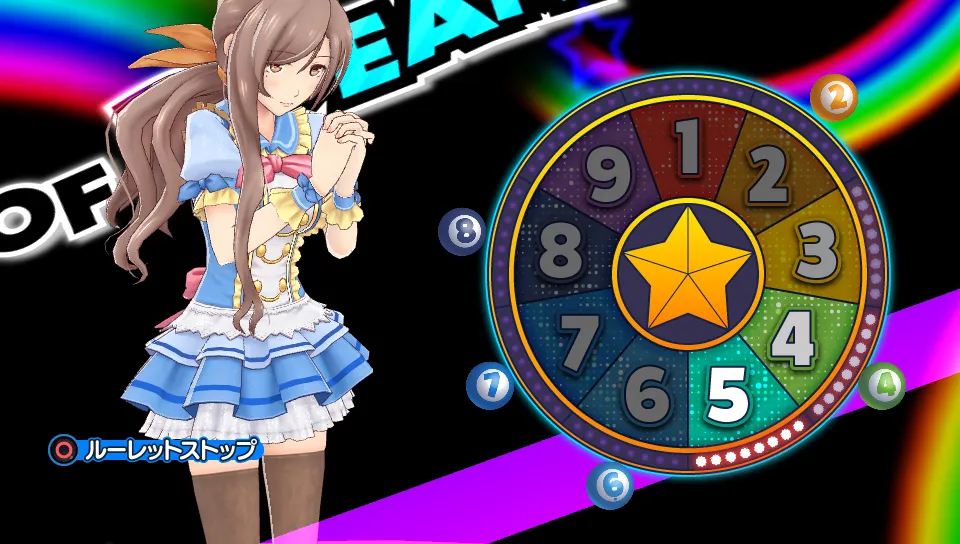
A smarter game would perhaps at least attempt to mask such naked hollowness with some pithy commentary about how money and production values alone can get you far in the world of idols, but Idol Death Game can't be bothered to recycle even that tired critique. The coins are simply a vector to move from one gameplay flag to the next, the other systems serving as little more than nigh-irrelevant set dressing to give it the appearance of a more thoughtful game, let alone competition to Japan's most popular adventure game series in the 2010s. And that's really its essence once you strip away the coin hunting, the stat rigging, and lackluster idol intrigue: it simply can't bring itself to compete on any other merit than its character designs and voice cast. Spike Chunsoft circa 2010 was hardly the most monied publisher in Japan, either. The original Dangan Ronpa was also plainly created on the relatively cheap. The difference is those developers cut its fat in smart places when it came to its presentation to bolster the other parts of the game, make it a fuller, more impactful experience on the whole. Idol Death Game, on the other hand, places its bet entirely on the mere idea of gruesome idol voyeurism being enough to shift copies at the expense of any semblance of an engaging game. It is an elevator pitch that D3 charged 7500 yen at launch to hear.
And am I going to stop playing after I upload this post? Probably not, or at least not yet. This game may well have already run out of things to say after the two routes I've already cleared, but by god, mediocrity like this doesn't come along every day in galge anymore, or at least in non-visual novel form, and Idol Death Game's is the kind that's captivating to me about once every five to seven years. You may well have not heard the last that I've had to say about this napkin doodle of a game and for that, I'm sorry.
